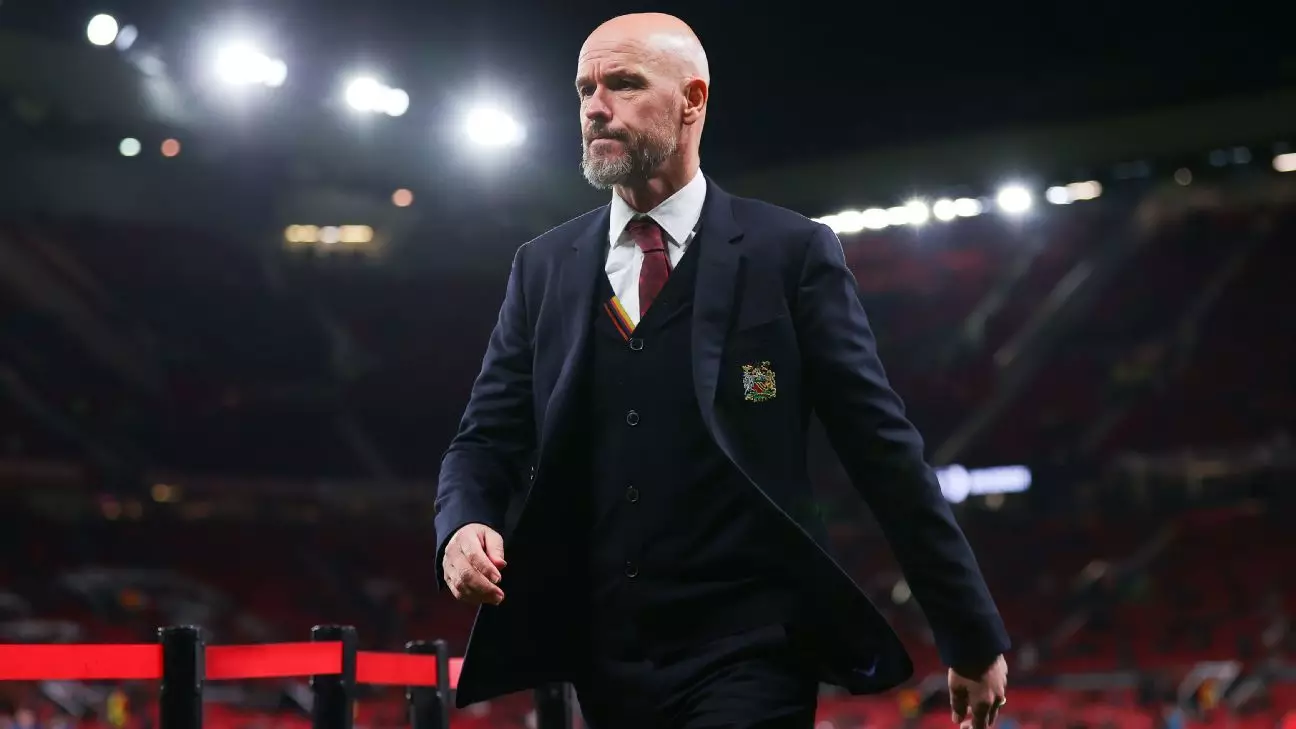In the heart of Manchester, a football club steeped in tradition and ambition faces a stark reality that contrasts sharply with its storied past. Manchester United, once lauded as one of Europe’s footballing elite, now finds itself entrenched in the UEFA Europa League, a revelation that raises eyebrows among fans and analysts alike. Their recent performance against FC Twente epitomizes this current predicament. While the team might aspire to be among the giants of European football, their on-field display showcased a disconcerting lack of cohesion and dominance, drawing an all-too-familiar parallel with their struggles from previous seasons.
The match against FC Twente, which ended in a lackluster 1-1 draw, served as a sobering reminder of Manchester United’s inadequacies. Twente, positioned fourth in the Eredivisie and considered underdogs in this matchup, exhibited grit and resilience that United failed to muster. The reaction from the approximately 4,000 Tukkers fans inside Old Trafford underscored the emotional significance of the moment: they celebrated as if they’d conquered a mighty fortress rather than merely salvaging a draw. This enthusiasm highlighted a poignant reality where an influx of optimism swirled around a team that had shown limited ambition.
Erik ten Hag, the club’s manager, is now under an ever-growing microscope as the shadows of doubt loom larger with each passing match. Having previously been seen as a potential architect of a revival, his tenure is beginning to reflect the tumultuous journey of the club itself. The criticisms surrounding his tactical choices and team selections are mounting, particularly as he prepares for a series of crucial fixtures against formidable opponents like Tottenham Hotspur and FC Porto. His claims of not wishing to “hurt something you love” when competing against a former club hints at a burgeoning emotional battle of his own, as his professional identity is closely tied to the club’s fortunes.
Ten Hag’s assertions that players must “give 100%” resonate deeply in light of the performance against Twente. This draw, lacking flair and efficiency, could be seen as a warning siren, echoing through Old Trafford and drawing attention to a concerning trend: opportunities are being squandered. The manager’s admission that his side didn’t capitalize on their lead and failed to suppress Twente’s burgeoning momentum should be a wake-up call. The missed chances, both in this match and across the Premier League season, form the crux of United’s issues and raise questions about player mentality and preparedness.
Statistically, Manchester United’s output has been alarmingly poor in front of goal. The numbers reveal a stark narrative: only five goals produced from five Premier League fixtures is a testament to their struggles. While they exhibited a willingness to attack—evidenced by 19 shots against Twente—conversion rates remain painfully low, underscoring a dire need for clinical precision in finishing. Ten Hag’s acknowledgment that “we have to work on this” speaks volumes; the pathway to improvement is fraught with challenges as both individual players and team dynamics must evolve to mend this sizeable gap in performance.
Furthermore, Manchester United’s current Europa League journey signifies more than mere participation in a secondary competition; it represents a pivotal opportunity for the team to regroup and rekindle their competitive edge. The absence of teams dropping down from the Champions League in the new format means that the road to success may not be as competitive as previously anticipated. Traditional rivals like Tottenham and AS Roma may emerge as the biggest hurdles; still, an atmosphere of uncertainty surrounds United’s ability to secure success amidst such evolving dynamics.
With an imperative to reclaim their status among Europe’s elite, Ten Hag understands that immediate results are crucial. Yet, the lurking specter of past failures and current performances places him in a precarious position. As he attempts to navigate his squad through the complexities of multiple competitions while managing players returning from injury, the pivotal nature of each match deepens. The European stage offers a chance—not just to secure silverware, but to restore pride and a competitive spirit that has faded.
Manchester United’s current dalliance with the Europa League should serve as a harbinger of urgency. The sobering reality is that, for now, they must embrace this secondary tournament as a crucial building block towards redeveloping their legacy. The draw against FC Twente symbolizes the crossroads at which the club finds itself, teetering between hope and despair. Without tangible improvements, returning to the Champions League may become a distant dream rather than an achievable milestone. For Erik ten Hag and his players, the time for reflection has passed; now is the hour for action.

